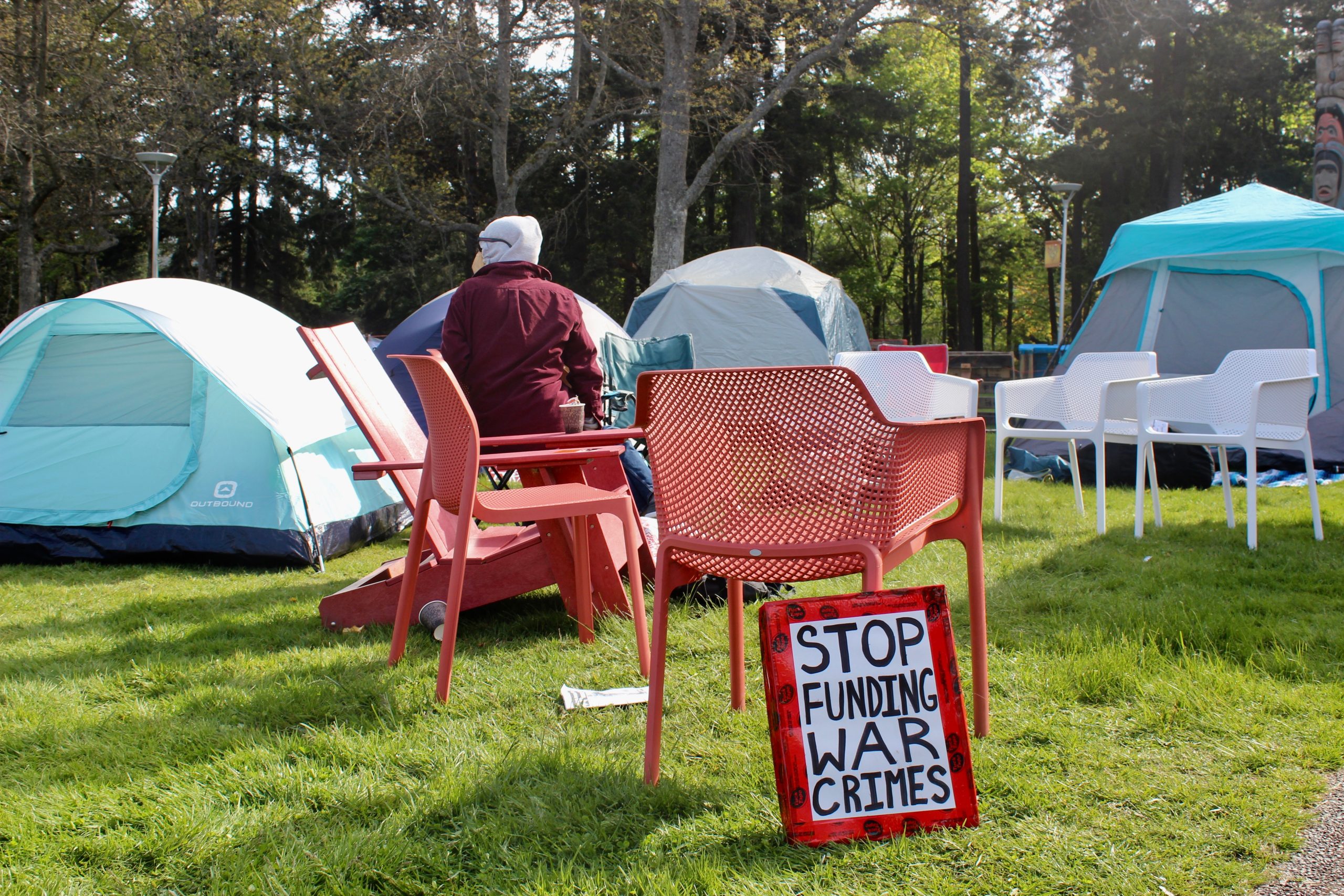Pro-Palestine encampment says it will remain until UVic divests

Photo by Sydney Lobe
One week after the People’s Park began camping out in solidarity with Palestine on UVic’s quad, protesters have declared that they will remain until their demands are met: UVic must boycott, divest from, and sanction (BDS) Israel on account of its actions in Gaza since October 7.
Of their BDS demands, the People’s Park’s insistence that UVic divest from “all investments connected to companies that contribute to and benefit from the genocide of the Palestinian people” is drawing the most public attention because of the practical weight of the demand.
However, UVic says divesting from corporations is an arduous process. UVic’s indirect investments in or associations with Thyssenkrupp Marine Systems Canada Ltd., BlackRock investment management, and Scotiabank are the targets of protesters’ divestment demands.
In an emailed statement to the Martlet, UVic explains that because the university executes its investment policy through collaborations with external managers, they are bound to certain legal terms regarding their investments. Thus, “divestment itself can be quite complex and, in some cases, require long-term planning.”
UVic’s indirect investments
Hailey, co-leader of Divest UVic, a student-lead group that successfully petitioned UVic to divest from fossil fuels in 2021, explains that “direct investments are companies that [UVic is] putting money into — those are listed publicly — and then an indirect investment would be companies that those companies invest in.”
All three companies that pro-Palestine protesters demand divestment from are either tied to Israel through indirect investments or associations.
The Canadian branch of Thyssenkrupp Marine Systems Ltd., a German systems provider for ships, submarines, and maritime electronics, is located in Vancouver Island Technology Park, which is a UVic enterprise. Thyssenkrup Ltd. has provided the Israeli Navy with a number of vessels
BlackRock is an investment management company in New York. As of March, 2023, UVic has $4,344,342 invested in BlackRock’s Global Renewable Power Fund, which focuses on investing in solar and wind renewable power generation projects. BlackRock also has shares in Lockheed Martin, an aerospace, arms, and defence corporation that has ongoing Industrial Participation agreements with Israeli defence companies.
The University of Victoria also has $258,372 worth of corporate bonds with the Bank of Nova Scotia through the RBC Vision Fossil Fuel Free Short Term Bond Fund. Scotiabank is the largest shareholder in Elbit Systems Ltd., the primary artillery supplier to the Israel Defense Forces. *See Editor’s Note.
A UVic spokesperson notes that “the 2023 investment report has some information that is now outdated,” though they do not specify what.
Kristan Jensen, associate professor of physics and astronomy at UVic, explains that as research faculty, he finds the encampment’s divestment demands troubling. It is a “giant category error,” he says, to identify Israel-associated research investments with the war effort.
Regarding the campers’ demand that UVic “cut all ties with Israeli universities,” Jensen says, “the scientists working in those universities are scientists.” He continues: “these … efforts, I think, are largely symbolic.”
Responsible Investing Policy
In response to the divestment demands of the People’s Park, UVic seems to be focusing their energy on the revision of their Responsible Investing Policy, with no explicit mention yet of working toward divestment. In an emailed statement to the Martlet, they say “the university is reviewing the policy,” and that they welcome those at the encampment to join the conversation.
Divest UVic has recently expanded their focus to the ethicality of all UVic’s investments, including social, political, and environmental factors. The main focus of their new mission is providing feedback to UVic about its Responsible Investing Policy.
The policy, which applies to all working capital investments, states that “factors relating to business practices that have an impact on the rights, well-being, and interests of people and communities” will be considered during their investment screening process under its social factors section. This includes “activities in conflict zones” and “controversial weapons”. UVic is also a signatory to the Principles for Responsible Investment (PRI) which is sponsored by the United Nations and includes human rights considerations.
However, Hailey explains that Divest UVic, with help from the Racialized Law Student Collective, carefully analyzed the policy and found “a lack of current policies surrounding the consideration that should be given to human rights violations.”
According to Hailey, this is because the way the policy is written is complex, and it is unclear who exactly must abide by the policy.
The coming days will tell how UVic considers revising its Responsible Investing Policy going forward. In their admin statement, the People’s Park states that “it appears [UVic is] trying to tire us out,” regarding their allegedly unproductive recent conversations with two UVic administrators.
Given the complexity of divesting, it seems unlikely that the People’s Park will see demands met.
Despite this, protesters at the encampment maintain that they will camp until UVic implements “BDS guidelines to their investments” — and they remain firmly planted on the quad.
“We will be here until OUR student dollars stop funding the genocide of Palestinian people,” reads the camp’s admin statement.
*Editor’s Note, May 10: This article was informed by UVic’s most recent annual investment report, which was released in March of 2023. On May 10, 2024, President Kevin Hall announced that UVic is no longer invested in the Bank of Nova Scotia.







